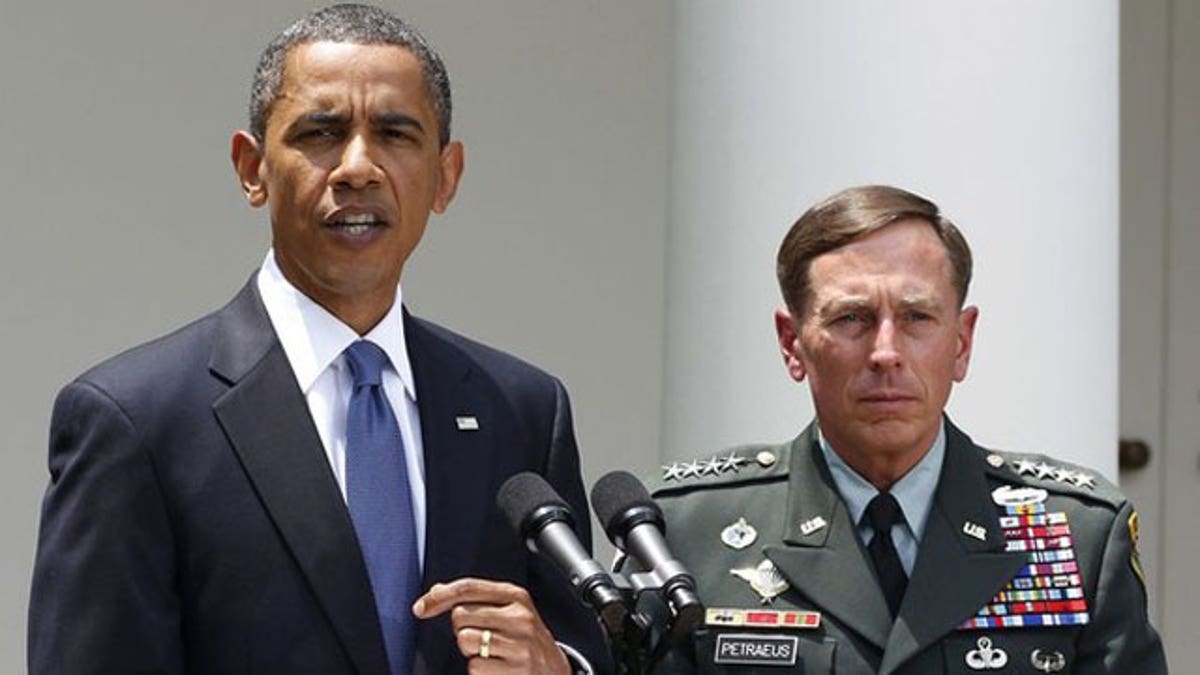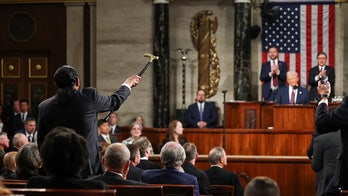
June 23: President Obama announces that Gen. David Petraeus, right, will replace Gen. Stanley McChrystal as his top commander in Afghanistan while in the Rose Garden of the White House in Washington (Reuters).
Even as most American voters support the U.S. military action in Afghanistan, a majority thinks bringing stability to the region is unattainable. In addition, more voters than not think President Obama is unprepared to do whatever it takes to win there, according to a Fox News poll released Thursday.
The president received bipartisan praise for replacing Gen. McChrystal over critical remarks he and his staff made about the administration, yet his overall job performance rating is mostly unchanged. The poll finds 47 percent of voters approve of the job President Obama is doing, compared to 46 percent two weeks ago (8-9 June 2010). Disapproval held steady at 45 percent.
The president’s average ratings for the year are 46 percent approve and 46 percent disapprove.
Similarly, views are split on whether Obama has been an "effective" president so far: 50 percent of voters think he has been, while 47 percent disagree. Most Democrats -- 86 percent -- describe Obama as an effective president. To varying degrees, majorities of Republicans (78 percent) and independents (56 percent) think he has not been effective so far.
By a 62-31 percent margin, voters support the military’s efforts in Afghanistan. Previously, 64 percent supported the action and 27 percent opposed it (September 2009).
Click here to see the raw data
Despite this significant support for the action, many American voters are uncertain the U.S. can succeed in Afghanistan. Thirty-three percent think it is possible to achieve stability in the region. A 58 percent majority disagrees.
Among those supporting the military efforts, 44 percent think it's possible to achieve success and 45 percent don’t.
By 49-40 percent, more voters think Obama is not prepared to do "whatever it takes" to win in Afghanistan.
Views are mixed on Obama’s handling of the situation in Afghanistan: 46 percent approve and 41 percent disapprove. In April, 49 percent approved and 36 percent disapproved. About a third -- 34 percent -- would stick with the president’s announced July 2011 withdrawal date regardless of conditions in Afghanistan. A majority of voters though -- 58 percent -- would start removing troops next summer only if conditions on the ground permit it.
The number believing the efforts in Afghanistan are important to homeland security has declined. Three-quarters (76 percent) believe what happens in Afghanistan matters to their security here at home. That’s down from 83 percent in December.
On a list of top issues, the wars in Iraq and Afghanistan rank fourth as being the most important for the president to be working on right now. The top issue by a wide margin is the economy/jobs, followed by the oil spill, the federal deficit and then Iraq/Afghanistan, which ties with the issue of health care.
By a 6 percentage point margin, more people think McChrystal deserved to be fired (42 percent) than think he didn’t (36 percent). About one voter in five has no opinion or was unaware of the firing. President Obama relieved Gen. McChrystal of his duties on June 23 after Rolling Stone magazine published an article quoting the military commander and his staff making critical remarks about the administration and others.
McChrystal was replaced by Gen. David Petraeus, who was serving as commander of U.S. Central Command and was previously the commander of coalition forces in Iraq. The Senate confirmed Gen. Petraeus as the top commander in Afghanistan on Wednesday.
Most American voters have "a great deal" (29 percent) or "some" (36 percent) confidence in Gen. Petraeus. For comparison, 26 percent of voters have "a great deal" and 31 percent have "some" confidence in Obama.
One in four voters says they have no confidence at all in the president (26 percent). That’s about four times as many as say they have no confidence in Petraeus (6 percent). It’s important to note that one in five voters (21 percent) is unable to offer an opinion on Petraeus.
The national telephone poll was conducted for Fox News by Opinion Dynamics Corp. among 900 registered voters from June 29 to June 30. For the total sample, the poll has a margin of sampling error of plus or minus 3 percentage points.












































